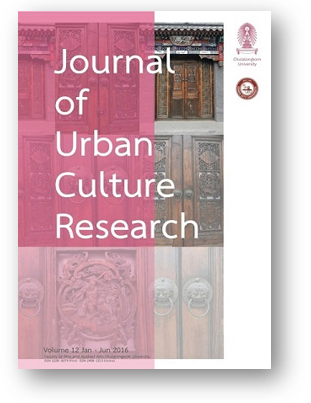Cities as Cultural Ecosystems: Researching and Understanding Music Sustainability in Urban Settings
DOI:
https://doi.org/10.14456/jucr.2016.1Keywords:
Sustainability, Musical Ecosystems, Urban Arts Research, UNESCO, Intangible Cultural HeritageAbstract
From the beginning of the twenty-first century, there has been a rapid growth of interest in the preservation of Intangible Cultural Heritage (ICH), stimulated by a suite of UNESCO Conventions and Declarations (2001, 2003, 2005, and UNCHR 2007). Globally, this has led to impressive growth of awareness and efforts to preserve the world’s arts and crafts, and considerable investment by many countries in initiatives to preserve cultural diversity. A key element in these efforts is defining the nature of what needs to be preserved in consultation with communities, and devising strategies on how best to approach the particular challenges that entails. While globalization and urbanization are often painted as the enemies of sustainability, I argue that most struggles and celebrations of sustainability in the arts inevitably play out in contemporary urbanized, globalized, mediatized, and commodified environments, which may be part of the solution as much as they are part of the problem. Following the work of scholars like Titon, this paper argues it is imperative to regard cultural practices as part of dynamic processes in dynamic environments rather than as artefacts in static environments. At its centre is a model of ‘cultural ecosystems,’ outcome of a five-year international research project (2009-2014) funded by the Australian Research Council: Sustainable futures for music cultures: Toward an ecology of cultural diversity. Taking music as an example, this article explores how an ecological approach can shed new light on approaches to cultural sustainability in urban environments.
Downloads
Published
How to Cite
Issue
Section
License
Authors authorize the JUCR to publish their materials both in print and online while retaining their full individual copyright. The copyright of JUCR volumes is retained by Chulalongkorn University.
The views and opinions expressed herein are those of the individual author(s) and do not necessarily reflect the policies or opinions of the Journal (JUCR), it editors and staff, Chulalongkorn University, or Osaka Metropolitan University.








